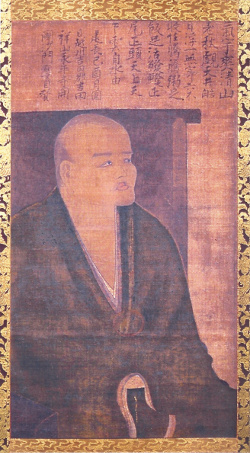July 2022 Newsletter
Throssel Hole Buddhist Abbey
50th Anniversary Celebrations
This year marks the 50th Anniversary of Throssel Hole Buddhist Abbey, and on Sunday the 26th of June a festival day was held at Throssel to celebrate the occasion. Including the monastic community there were about 100 people there for the day, and the Ceremony Hall was very full for the Festival Ceremony and Dharma Talk, as well as for the meditation period which preceded them.
Rev. Berwyn, the vice-abbot of Throssel was the celebrant for the ceremony, and in the photo below he is making a first incense offering at the main altar. To his left, facing the camera, is Rev. Ryozan who is now a novice monk at Throssel, but previously trained as a lay person at the temple here in Leicester.
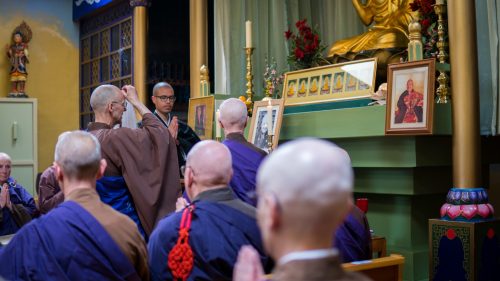
The photo below gives a good sense of the number of people at the ceremony, including five visiting monks and members of the Lay Sangha from around the country. Rev. Aiden travelled up to Throssel for the weekend, together with members of the Nottingham meditation group, and all of them can be seen in this photo, if you look carefully!
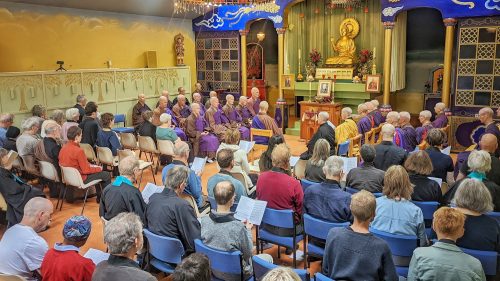
In the photo below you can see the embroidered dragons on the kesa that Rev. Berwyn is wearing. This kesa had belonged to Rev. Alexander, who died last November, and it was very nice to see it at the centre of the ceremony.
The central image on the front altar is a photograph of Rev. Master Jiyu, the founder of our order, when she was in Japan in the 1960s. To the right is a photograph of her Japanese master Kōhō Zenji, and to the left is Great Master Dōgen. The picture of him is a reproduction of his famous self-portrait, the original of which hangs in Hōkyō-ji monastery in Japan.
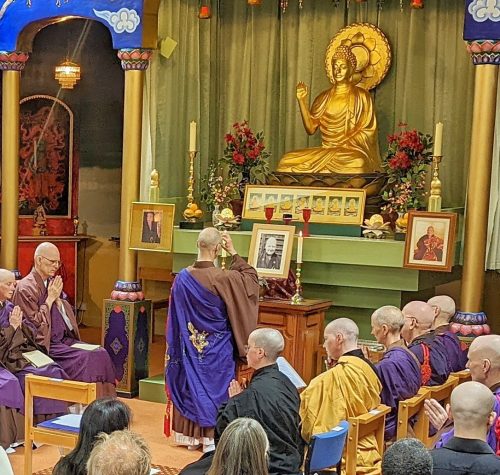
Following the ceremony Rev. Master Daishin gave a Dharma talk entitled ‘Zazen and the Self’. Referring to the line in Dōgen’s Rules for Meditation, “neither trying to think nor trying not to think”, which he encountered when he was first introduced to Zazen, Rev. Master explains how putting that into practice is the means of both realizing the truth and understanding the self.
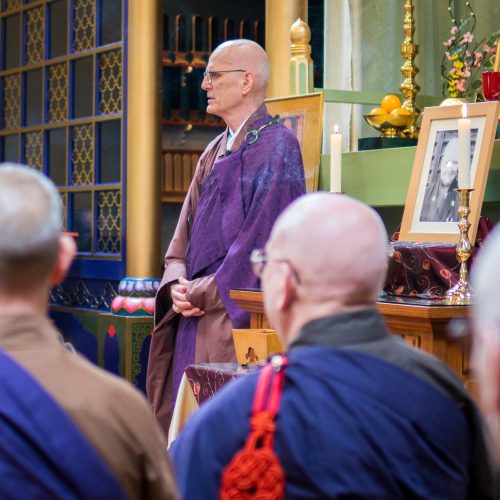
Rev. Master Daishin was the previous abbot of Throssel Hole, retiring in 2019 after nearly 40 years as abbot. The Talk is available in video and audio versions on the Throssel website. We will also listen to it at our Dharma Evening on Wednesday of next week (the 6th of July).
Following the Dharma Talk we had a festive lunch, with quite a few people sitting outside to eat despite the rather cool and windy conditions. Throughout the afternoon a display of photographs from throughout Throssel’s history was shown in the Common Room, and the photo below shows a moment when this was interrupted to play a short video of Rev. Master Jiyu when she was at Throssel in the early 1970s.
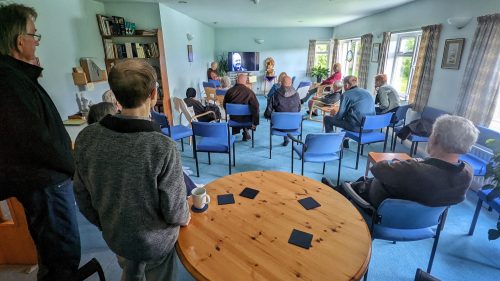
Forthcoming Events: The Festival of Great Master Dōgen
On Saturday the 2nd of July we will be celebrating the Festival of Great Master Dōgen. Great Master Dōgen was a thirteenth century Japanese monk. He has a very important place in our tradition, as he brought the Sōtō Zen school of Buddhism from China to Japan. This festival is an opportunity to celebrate his life and teaching.
In addition to welcoming visitors to the temple for the festival (please book in advance), we will also be holding the festival over zoom so that Lay Sangha members can join in from where they are. Full details of the festival day have been sent out by email to Lay Sangha members.
This festival day will run from 10am to 4pm, with the Festival and Dharma Talk both in the morning so that people can come just for those if they would prefer. There will then be the option to stay on for a bring-and-share lunch and an afternoon of meditation, followed by tea and biscuits.
Buddhist Stories
There are many stories in Buddhism, from the time of the Buddha onwards, and they are very helpful in illustrating aspects of the Buddha’s teaching and Buddhist practice.
George Fox and the Sword
This story involves two Quakers from the late 17th century, but the teaching in it is very Buddhist and relevant to us today. It emphasises the importance of exploring for ourselves what is the appropriate way to behave in a situation, rather than just following rules imposed from outside.
The two people who feature in this story are the founder of Quakerism, George Fox (1624-1691) and William Penn (1644-1718) who is best known as the founder of the Province of Pennsylvania in North America, and who became a Quaker during his lifetime. The first written account of this story appears nearly 150 years after William Penn’s death, and perhaps over 180 years after the events in it are said to have taken place, and as a result Quakers now generally regard it as an invented story. The teaching in it, however, is very real and very pertinent to how we explore what right action is in our lives.
When we have a growing sense that there is something we are doing, a way we are behaving in our lives, which we feel uncomfortable with, what do we do about that? Perhaps we are not quite sure why we feel uncomfortable, or exactly what the problem is, but we realise that we can’t ignore it. What should we do?
Coming to a sense of what is right and good to do isn’t easy, and sometimes it can take us quite a while to work through all the different issues that there are. To begin with we may just have a bit of a niggle that there is something that we need to pay attention to, but as we carry on with our practice, we may find that we become steadily less comfortable with it. As our practice deepens, we gradually see a bit more clearly what the issues are; why a particular thing isn’t so good to do, but we find that our attachments make it difficult for us to change course. This is just the process that William Penn went through, and here is the story;
William Penn had been going along to Quaker meetings, and was becoming deeply convinced by their practice. He attended meetings more and more frequently, and when he did so he dressed as gentleman did in those days, including wearing a sword. He just kept on dressing as he would normally have done on any other occasion, as that was what he was used to and it conveyed his status in society. However, he did also realise that wearing a sword was not in harmony with Quaker teaching; they were very much against conflict and anything related to conflict including, of course, swords.
One day William Penn happened to be at a meeting that George Fox, the founder of Quakerism, was also attending. William Penn asked George Fox whether it was acceptable for him to wear the sword, and George Fox replied, ‘I advise you to wear it as long as you can.’
Some time later they met again, and William Penn wasn’t wearing his sword. George Fox asked him why not, and he replied, ‘I took your advice; I wore it as long as I could.’ Or to put it another way, he’s saying, ‘It got to the point where I just couldn’t wear it any more’.
It’s a very short story, and the crux of the story is what happened during the gap between the first meeting and the second meeting. The important thing is what went on with William Penn’s practice during that time, and how his views on wearing the sword changed.
Even at their first meeting William Penn probably had a sense that he shouldn’t wear a sword, but on the other hand he was still attached to his gentlemanly attire, and to the way that he appeared to others. He couldn’t quite bring himself to relinquish the sword, but it was enough of a concern to him that he asked about it. That is a good thing to do, and in a Buddhist context this is what we call taking refuge in the Sangha; that we are willing to ask someone else about it, in particular someone who has a deeper understanding than us. Hopefully we get a helpful response, but the most important thing is that we ask the question, as in doing so we are acknowledging to ourselves that there is an issue here that we need to pay attention to.
George Fox’s answer (according to the story, which we should remember is almost certainly fictitious) which might seem rather an unexpected answer from someone who was a committed pacifist. By advising William Penn to keep wearing the sword as long as he could, however, he was turning it back to William Penn to come to his own sense of what was good to do, and in Buddhist practice that is absolutely what we each need to do for ourselves.
Buddhism is never about following a set of fixed rules, because every situation that we face is a new situation, and we can’t just look up in a book how to deal with it. We must develop our own wisdom; our own sense of how it is good to live.
If we were doing that with no help or support at all that would be a real challenge. But we do have lots of help and support; we have the Buddhist Precepts, we have the teachings of the Buddha, we have all sorts of guidance from those who have gone before us. But of course they didn’t live our life, they are not in the situation that we are. We can certainly apply the general principles that are embodied in the Buddhist Precepts, and in other Buddhist teachings, to our own life, but we won’t find an example in the Buddhist scriptures of someone who is experiencing exactly the circumstances that we are. In the end it has to be for us to make decisions about our life, because it is our life. We have to take responsibility for it, and it is us who will bear the consequences of the actions that we make or don’t make.
If we do things just because we are following rules, and things don’t work out all that well, then what is there for us to learn, because we never really fully understood why we were following these rules in the first place? If, on the other hand, we follow our own sense of what seems right to do and things don’t work out so well, then that is useful feedback on our actions. We realise that what we did wasn’t actually quite the right thing to do, and this helps guide us towards more skilful actions.
It is really important that we pay attention to this arising of cause and effect in our own lives, and that we learn from it. Learning from how things turn out doesn’t just mean the outward conditions of the situation. It includes that, but the most important aspect to pay attention to is the inner experience of, for example, not feeling very good about the way we behaved towards someone. Perhaps we initially thought that this was a perfectly acceptable way to behave, but now we realise that there was something about it that actually wasn’t quite right. We may not be quite sure what the particular problem is, and maybe it’s a lot better than we were behaving six months ago, but we can see that there is still room for improvement there. So next time we try to do things a bit differently, and pay attention to how that seems. In this sense our life is an ongoing experiment. How do we know how that experiment has turned out, and what to learn from it? It’s by paying attention to cause and effect.
In recent years Rev. Master Daishin has been quoting a phrase from Dōgen where he says that a crucial aspect of Buddhist training is ‘paying attention to cause and effect over time’. Dōgen is urging us to be aware of our actions, and to be aware of the consequences of them, on an ongoing basis. This means paying attention to what we do, and to the effect it has both on us and on other people. When we do that we can hone our sense of what Right Action is.
If we are not paying attention then we just tend to keep on making the same mistakes over and over; we don’t learn because we are not paying attention to the outcome, or to how we feel about what we have done. If we aren’t paying attention then that’s a real shame, because we won’t learn from life.
In Buddhism, the most powerful way that we have to deepen our understanding is through the practice of meditation, and without this it is very difficult for us to make much progress in understanding ourselves. In addition, however, most of our day is spent interacting with the world around us, and every interaction that we have is an opportunity for us to deepen our understanding. Everything we do throughout the day is an opportunity to see our own tendencies, to see the ways in which we trip ourselves up, and to then do something about that. This is even true of interactions with inanimate objects, so even if you are on your own at home just making lunch or making a cup of tea; if you find yourself getting annoyed by the fact that things don’t go quite as you planned, or that you haven’t got the right things, that is an opportunity to pause and pay attention to what is happening. Conditions are just as they are, neither for us nor against us, but we are responding to those conditions by getting irritated. And if we notice that this response causes our mind to be disturbed, then that leads us to want to do things differently, because we don’t want to have a disturbed mind. We want to be at peace.
Coming back to the story, George Fox’s answer is ‘I advice you to wear the sword as long as you can’. A Buddhist teacher wouldn’t tend to advise someone to keep doing something harmful, but they would certainly advise them to pay attention to how it feels; is this something that you can live with, behaving this way? Perhaps George Fox knew that William Penn wasn’t likely to actually get into a sword fight, so in advising him to wear it as long as he could he didn’t think he was putting him in any danger. What he was doing, however, was allowing William Penn himself the time and the space to sort through the issue in his own mind. What did it seem good to do? On the one hand he was a gentleman, and that’s how gentlemen dressed, and that seemed completely appropriate in everyday society. On the other hand he was becoming more and more deeply committed to the way of Quaker practice, and didn’t want to be going against that. There was something that seemed to be important and true, and which he realised his actions weren’t quite in harmony with. It obviously didn’t sit very comfortably with him because he asked about it. And as time went on, during the gap between when he is given that advice, ‘wear it as long as you can’, and when the two of them meet again and he is not wearing the sword, something has obviously shifted.
The focal point of the story is what happens during that time, and it’s helpful that there is just a gap there, and that we have to imagine for ourselves what happened. We are able to do this because it probably resonates with each of us, as there have been things we have been doing which we have felt uncomfortable with, and we maybe can’t quite resolve. We’re not sure what the right thing to do is, because there are arguments for and against.
Rev. Master Jiyu, the Founder of our order, had a phrase that she used in this sort of situation, about putting things ‘on the back burner’, in the same way that we might put something on the back burner of a stove and allow it to just cook away steadily. If we can’t resolve an issue immediately then we just allow that to bubble away too. We don’t have a high heat under it to try to cook it immediately, because we don’t really know how to proceed with it; but on the other hand we don’t take it completely off the stove, we allow it to keep bubbling away. Over time, just through being willing to keep sitting with it, to keep being aware of the issue, somehow things clarify in our mind, and we come to a deepening sense of what seems right for us to do. As we go on we put this into practice in our life, and learn from what the effects of it are.
William Penn has clearly gone through this process of reflecting on his own life; what his values were, what seemed good to do, what seemed appropriate. The fact that he kept on wearing the sword as long as he could meant that it was like a thorn in his side, working away at him. If George Fox had simply said, ‘Put the sword in your cupboard and never wear it again’, then William Penn may have been perfectly willing to do that, but it wouldn’t then have been a burning issue for him. Perhaps he wouldn’t really have come to an understanding for himself of why he shouldn’t wear it, or the fact that he didn’t actually want to, as it wasn’t in harmony with his most important values.
Eventually it got to the point where he felt, ‘I just can’t wear the sword any more, I see why this is something that I just can’t do.’ Perhaps he might have felt that wearing the sword was an embarrassment to him, or that it misrepresented who he was, as he wasn’t that person any more. This story is a very helpful one because it encapsulates the need for us to work for ourselves on an issue, however messy and time-consuming that might seem, rather than just being presented with a neat solution by someone else. The compassion of George Fox is that, in saying ‘keep wearing it… as long as you can,’ he is removing any external pressure on William Penn, giving him the chance to notice the internal pressure that he feels, and to explore what that is.
Those two bits, ‘keep doing it’ and ‘as long as you can’ are both part of the process. If our attachments are strong enough then we won’t be able to set them aside and we find that we do ‘keep doing it’, even though we realise there is a problem with that. However, if we keep paying attention to how that feels then we will get to the point where ‘as long as you can’ has been exhausted. We no longer can, and we have to let go and allow ourselves to be at peace.
Sources:
The story of George Fox and the Sword can be found on the Quaker faith & practice website:
https://qfp.quaker.org.uk/passage/19-47/
The quote from Dogen is from the Bussho chapter of the Shobogenzo:
The Buddha said, “If you want to understand buddha nature, you should intimately observe cause and effect over time. When the time is ripe buddha nature manifests.”
Treasury of the True Dharma Eye, Zen Master Dogen’s Shobo Genzo, edited by Kazuaki Tanahashi, p237.
Alms Bowl Requests
Donations of Food
Offering food is a traditional way to support a monk, and all donations of vegetarian food are most welcome. In particular:
- porridge oats
- peanuts or other nuts
- peanut butter
- fresh fruit and vegetables (except garlic or peppers)
- dried herbs
- cheese, eggs and yoghurt
Any other suitable items would also be appreciated.
Donations
The temple is dependent on donations for its continued existence, and any financial support you are able to offer is greatly appreciated. Details of how to offer support can be found on the Donations page of the website.
All donations are received with gratitude



